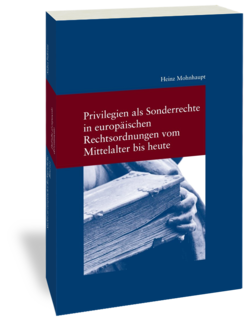Privilegien als Sonderrechte in europäischen Rechtsordnungen vom Mittelalter bis heute
Heinz Mohnhaupt
Studien zur europäischen Rechtsgeschichte 343
Frankfurt am Main: Klostermann 2024
XXI, 970 S.
ISBN 978-3-465-04624-0

Nowadays, the term ‘privileges’, part and parcel of political and societal discourse in countries worldwide, carries a negative connotation as it contradicts the concept of justice and equality in state and society. The original, legal meaning of this ubiquitous term, which dates back to Roman canon law, has largely become lost. The author traces the history and European dimensions of the ‘privilegia’ and their relevance for the evolution of law, state and society in a longue durée perspective. He complements his account with a comprehensive overview of sources by territory, an abridged version of which had initially been intended for inclusion in Helmut Coing’s Handbuch (vol. II/3), and a bibliography organised according to subject matter, ranging from the Middle Ages to the present day. A picture emerges how, by differentiating between the rights of individuals, groups and territorially defined areas of applicability, privileges also represented an individualised sense of justice, which prevailed until the Enlightenment and its – often futile – attempts to replace privilege thinking with laws applicable to all, in the sense of modern ‘égalité’.
